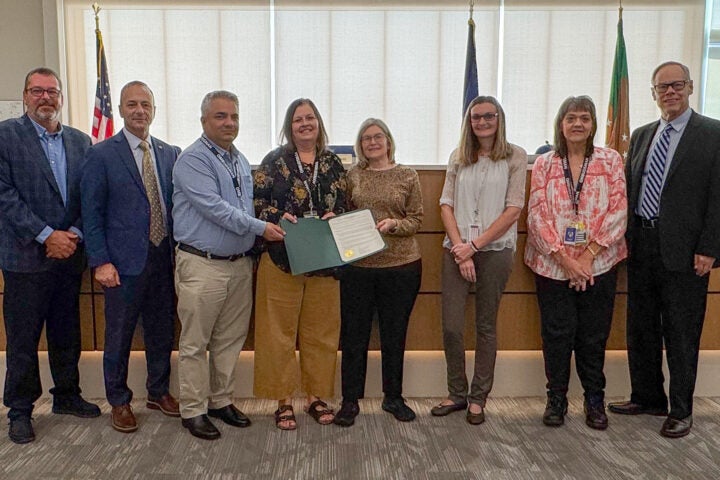Overview
The Franklin County Ombudsman Program advocates for those who can’t, supports those who can, and ensures all long-term care consumers live with dignity and respect.

Mission Statement
Pennsylvania Ombudsmen are federally mandated, legally based and state-certified via standardized training to actively advocate and give voice to older consumers of long-term care services, whether delivered in the community or a facility-based setting. Pennsylvania Ombudsmen champion the right of these consumers to achieve the highest quality of life and care wherever they reside. Pennsylvania Ombudsmen may be staff, volunteers or PEER residents; all are united through an impassioned commitment to listen, educate, investigate, mediate and empower through a visible presence.
What Is An Ombudsman?
‘Ombudsman’ is a Swedish word that means “citizen representative.”
Pennsylvania’s Long-Term Care Ombudsman Program works to resolve complaints and issues on behalf of individuals residing in long-term care settings, such as nursing homes, assisted living facilities, domiciliary and personal care homes, and adult day care facilities. Ombudsmen empower residents by educating them on their rights under federal and state law and advocate for those who are unable to advocate for themselves, to ensure that they receive the highest quality of care. An Ombudsman’s priority is to protect the rights of long-term care residents and ensure residents receive fair treatment and appropriate care by:
- Making routine, unannounced facility visits
- Identifying, investigating and resolving complaints
- Ensuring residents are receiving individualized care to meet their needs
- Educating residents, families and staff about residents’ rights and facility regulations
- Assisting in the development of resident and family councils
Who Uses An Ombudsman?
- Residents or potential residents of long-term care facilities, as well as individuals receiving services from community and adult day care
- Long-term care residents’ friends and families
- Long-term care administrators and agencies
- Members of community groups and government agencies
- Citizens who want to improve long-term care
Complaints An Ombudsman Can Address
- Staff are rough when providing care
- Staff are discourteous
- Not receiving mail or phone calls
- Questions about Medicare are not being answered
- Wrong medications are given or at the wrong time
- Nutrition and dietary concerns
- Personal property is lost or stolen
- They have not seen a physician in months
- Discrimination against residents in the LGBTQ community
- Activities are boring or the only activity is watching television
- Heating or air conditioning problems
- Inappropriate unsafe transfers and discharges
- Slow response to call lights
- Hearing aids and/or eyeglasses are missing
- Residents’ rights are being ignored
- Lack of participation in the care plan
- Issues with therapy
Residents’ Rights
Residents of long-term care facilities have numerous rights under federal and state law. Some of those rights include:
- Right to be treated with dignity and respect
- Right to know and exercise your rights
- Right to know about services and financial charges
- Right to be consulted in planning your medical treatment
- Right to decline medical treatment
- Right to confidentiality of records
- Right to privacy in treatment and care
- Right to freedom from restraints
- Right to express grievances without fear of retaliation
- Rights pertaining to admission, transfers and discharges, including the right to appeal
PEER Program
The Pennsylvania Empowered Expert Resident (PEER) project was initiated by the Pennsylvania State Ombudsman Office to work with long-term care residents who have volunteered their time and expertise to self-advocate issues that will resonate for their peers.
PEERs are trained within their own facilities at self-resolution and consumer empowerment. The PEER Project offers an additional mechanism to equip residents with the knowledge to enable them to be part of the solution. It offers a resident dimension that has been too frequently overlooked.
Volunteer Ombudsman
Volunteer Ombudsmen are individuals specially trained to provide information, guidance and representation to assist individuals with problems and concerns they may have in their facility. The focus of the Volunteer Ombudsman is to alert residents to the Ombudsman Program and to promote residents’ rights.
The Volunteer Ombudsman’s duties include making visits to residents in nursing homes, assisted living homes, personal care homes and adult day facility programs at least once per quarter. During these visits to a home, the volunteer will talk to numerous residents to see if they have any concerns that may need addressed. If the problem seems to rise to the point that an investigation is needed, the volunteer will make a referral to the local Ombudsman.
If you need help, have questions or concerns about long-term care Ombudsman services, contact our office.
Phone: Call the local Franklin County Ombudsman at 717-261-0631, ext. 20631. Phones are answered Monday-Friday, 8 a.m. to 4:30 p.m. You may also leave a message for your call to be returned.
Email: Contact the local Franklin County Ombudsman, Tressia Day, at tsday@franklincountypa.gov.
Walk-Ins: Visit the Franklin County Ombudsman, Tressia Day, Monday-Friday, 8:30 am – 4:30 pm, at the Franklin County Human Services Building.
Additional Information: Details about Pennsylvania’s Long-Term Care Ombudsman or PEER Program are available by contacting:


